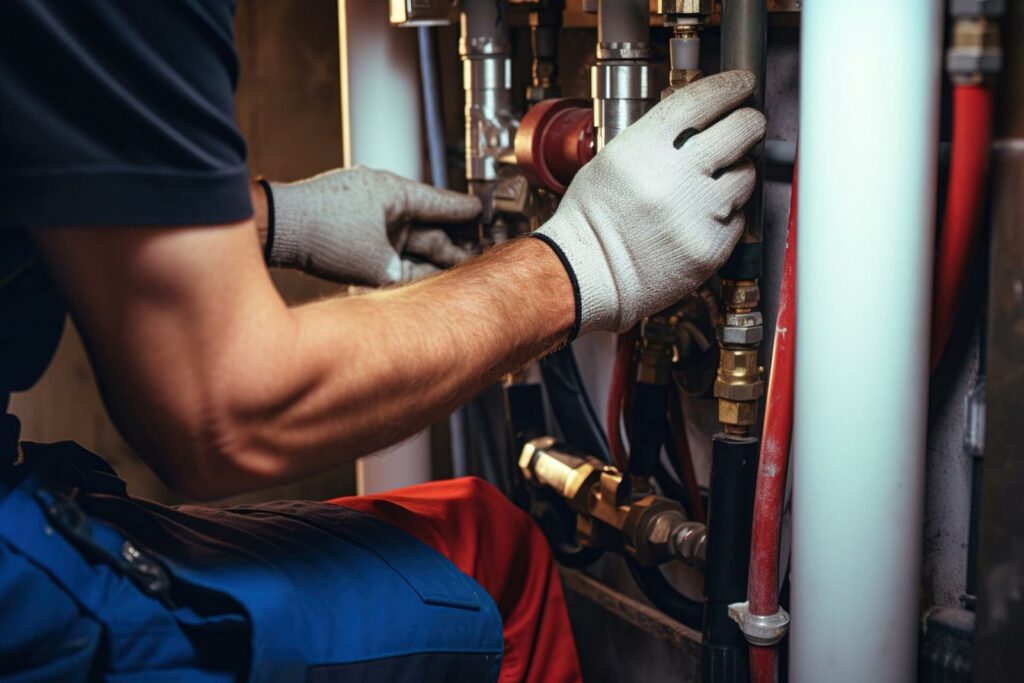Looking to ensure the longevity of your heating pipes? Well, fear not!
In this discussion, we will explore the six best materials for creating durable heating pipes that will withstand the test of time.
From the classic choice of copper to the modern marvel of PEX (Cross-Linked Polyethylene), there is a wide range of options to consider.
So, whether you’re a homeowner or a professional in the field, buckle up and prepare to discover the top materials that will keep those heating pipes running smoothly for years to come.
Key Takeaways
- Copper and stainless steel are highly conductive metals with excellent heat transfer properties, making them ideal choices for long-lasting heating pipes.
- PEX (Cross-Linked Polyethylene) is a cost-effective option that is highly flexible, resistant to corrosion and has efficient thermal properties for heat transfer.
- Cast iron, ductile iron, and coated steel pipes offer exceptional strength and durability, reduce noise transmission, and require regular maintenance for longevity.
- PVC (Polyvinyl Chloride) and polypropylene pipes are durable, affordable, easy to install, and resistant to corrosion, making them reliable choices for long-lasting heating systems.
Copper
Copper is a highly conductive metal that’s commonly used for long-lasting heating pipes. When it comes to the benefits of copper in heating pipes, there are several key advantages that make it a popular choice.
Firstly, copper pipes have excellent heat transfer properties, allowing for efficient and quick heating throughout the system. This means that your home will warm up faster and more evenly, providing you with a comfortable living space.
Additionally, copper pipes have a long lifespan, often lasting for decades without needing to be replaced. This durability ensures that your heating system will function effectively for years to come, saving you time and money on repairs and replacements.
In comparison to other materials used for heating pipes, copper stands out in multiple ways. One of the main advantages is its resistance to corrosion. Copper is highly resistant to rust and other forms of degradation, making it ideal for use in water-based heating systems. This means that your pipes will remain intact and reliable, with minimal risk of leaks or damage.
Furthermore, copper is a flexible material, allowing for easy installation and maintenance. Its malleability makes it easier to navigate around obstacles and fit into tight spaces, reducing the need for complicated and costly modifications.
Stainless Steel
Stainless steel, a durable and corrosion-resistant material, is another excellent option for long-lasting heating pipes. When considering stainless steel for your heating system, it’s important to be aware of its advantages and disadvantages and compare it to copper, another popular choice.
Advantages of stainless steel:
- Longevity: Stainless steel pipes have a longer lifespan compared to other materials, such as copper. This means fewer replacements and less maintenance over time.
- Corrosion resistance: Stainless steel is highly resistant to corrosion, making it ideal for heating pipes that come into contact with water and other corrosive substances.
- Strength: Stainless steel pipes have high tensile strength, allowing them to withstand high pressures and temperature variations without compromising their structural integrity.
Disadvantages of stainless steel:
- Cost: Stainless steel pipes tend to be more expensive than copper pipes. However, when considering the long-term benefits and durability, the initial investment pays off.
- Installation challenges: Stainless steel pipes require special tools and techniques for installation. It’s important to hire experienced professionals who are familiar with working with this material.
- Thermal conductivity: Compared to copper, stainless steel has lower thermal conductivity. This means it may take longer for the pipes to heat up and distribute heat throughout the system.
When comparing stainless steel to copper, both materials have their strengths and weaknesses. While copper is known for its excellent thermal conductivity, stainless steel offers superior corrosion resistance and longevity. Ultimately, the choice between the two will depend on your specific needs, budget, and the environment in which the heating pipes will be installed.
PEX (Cross-Linked Polyethylene)
One material worth considering for long-lasting heating pipes is PEX (Cross-Linked Polyethylene), which offers several advantages over traditional options.
PEX pipes have gained popularity in recent years due to their numerous benefits. Firstly, PEX pipes are highly flexible, making them easier to install and maneuver around obstacles compared to rigid materials like copper or steel. This flexibility also allows for fewer joints, reducing the risk of leaks and improving overall system efficiency.
Another benefit of PEX pipes is their resistance to corrosion and scale buildup. Unlike metal pipes, PEX isn’t susceptible to rust or mineral deposits, ensuring a longer lifespan for your heating system. Additionally, PEX pipes have excellent thermal properties, providing efficient heat transfer and minimizing energy loss.
When comparing PEX pipes to other materials, cost-effectiveness is a significant advantage. PEX pipes are generally more affordable than copper or stainless steel, making them a budget-friendly option for both residential and commercial projects. Moreover, PEX pipes are lightweight, further reducing installation costs and allowing for easy transportation.
In terms of durability, PEX pipes have proven to be highly resistant to freezing, making them suitable for cold climates. They can expand and contract without cracking, ensuring reliable performance even in extreme temperature conditions.
Lastly, PEX pipes offer superior sound insulation, reducing noise transmission within your heating system. This is particularly beneficial for buildings with multiple units or sensitive areas where noise control is essential.
Cast Iron
If you’re looking for a durable alternative to PEX pipes, consider cast iron for your heating system. Cast iron pipes have been used in plumbing and heating systems for centuries, and for good reason. They offer a range of benefits that make them a reliable choice for long-lasting heating pipes.
Here are three reasons why cast iron is a great option for your heating system:
- Durability: Cast iron pipes are known for their exceptional strength and durability. They can withstand high temperatures and pressure, making them ideal for heating systems. Unlike other materials, cast iron pipes are less likely to crack or break, ensuring a longer lifespan for your heating system.
- Noise Reduction: One of the advantages of cast iron pipes is their ability to reduce noise. The dense material absorbs sound vibrations, minimizing the noise generated by water flowing through the pipes. This can create a quieter and more peaceful environment in your home.
- Low Maintenance: Cast iron pipes require minimal maintenance compared to other materials. They’re resistant to corrosion and rust, which means you won’t have to worry about frequent replacements or repairs. With proper installation and regular inspections, cast iron pipes can last for decades.
When it comes to cast iron alternatives, there are a few options to consider. Ductile iron pipes are a modern variation of cast iron pipes that offer improved flexibility and strength. Another option is coated steel pipes, which provide similar benefits to cast iron but with a lighter weight. However, it’s important to note that these alternatives may come at a higher cost.
Regular maintenance is crucial to ensure the longevity of your cast iron pipes. This includes periodic inspections, cleaning, and addressing any issues promptly. By taking care of your cast iron pipes, you can enjoy a reliable and long-lasting heating system for years to come.
PVC (Polyvinyl Chloride)
PVC (Polyvinyl Chloride) is a versatile material commonly used in heating systems for its durability and affordability. When it comes to resistance to high temperatures, PVC pipes are reliable and can handle the heat. They’ve been designed to withstand the demands of heating systems, ensuring that your pipes will last for a long time.
One of the key advantages of PVC pipes is their flexibility and ease of installation. Unlike other materials, PVC pipes can be easily bent and maneuvered to fit the layout of your heating system. This flexibility not only saves you time during installation but also allows for a seamless connection between pipes, reducing the risk of leaks or breaks.
Furthermore, PVC pipes are lightweight, making them easier to handle and transport. This can be particularly beneficial if you’re installing the heating system yourself or if you have limited assistance. The lightweight nature of PVC pipes also means that they’re less likely to strain or damage other components of your heating system.
In addition to being resistant to high temperatures, PVC pipes are also highly durable. They aren’t prone to corrosion or rust, ensuring that your heating system remains efficient and reliable for years to come. With proper care and maintenance, PVC pipes can provide you with the peace of mind of knowing that your heating system is built to last.
Polypropylene
Polypropylene is a highly durable material that offers several benefits for heating pipes. Its strength and resistance to corrosion make it an excellent choice for long-lasting piping systems.
Additionally, polypropylene is lightweight, cost-effective, and easy to install, making it a practical option for heating applications.
Durability of Polypropylene
Polypropylene’s durability makes it an ideal choice for long-lasting heating pipes. When it comes to the lifespan of the pipes, polypropylene is known for its exceptional longevity. You can trust that your heating system will keep running smoothly for years.
In addition to its longevity, polypropylene also boasts impressive corrosion resistance. This means that your pipes won’t be susceptible to rust or other forms of corrosion, ensuring the integrity of your heating system.
With polypropylene, you can rest easy knowing that your heating pipes are built to last. Say goodbye to frequent repairs and replacements, and say hello to a reliable and durable heating system that will provide warmth for you and your loved ones.
Benefits of Polypropylene for Heating Pipes:
- Long lifespan
- Excellent corrosion resistance
- Reliability and durability
Benefits of Polypropylene
When it comes to heating pipes, one material stands out for its exceptional benefits: polypropylene. Polypropylene is a popular choice for heating pipes due to its many advantages. It is a durable and lightweight material that can withstand high temperatures without warping or deteriorating. Additionally, polypropylene is resistant to corrosion and chemicals, making it ideal for various applications in the heating industry. Its flexibility and ease of installation make it a cost-effective option for both residential and commercial heating systems.
Below is a table highlighting some of the key advantages and applications of polypropylene in heating pipes:
| Advantages | Applications |
|---|---|
| Durable | Underfloor heating systems |
| Lightweight | Radiator connections |
| Resistant to corrosion and chemicals | Hot water supply |
| Easy to install | Solar heating systems |
| Cost-effective | Central heating systems |
With its numerous benefits and versatile applications, polypropylene is an excellent choice for long-lasting heating pipes. By using this material, you can ensure efficient and reliable heating in your home or business.
Review
So there you have it, the six best materials for long-lasting heating pipes.
Whether you choose copper, stainless steel, PEX, cast iron, PVC, or polypropylene, each material offers its own advantages and strengths.
From durability to corrosion resistance, these materials are sure to provide reliable and efficient heating for years to come.
So go ahead and make your choice based on your specific needs and enjoy the benefits of a long-lasting heating system.

